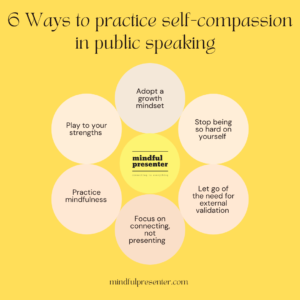
The internet and book stores are overflowing with advice on how to achieve public speaking success.
- Know your audience
- Craft a clear message
- Prepare, practice, pause
- Make eye contact
- Keep it simple
- Watch your body language
- Use compelling visuals
- Open and close with impact
- Imagine your audience in their underwear (please don’t!)
There are many, many more
Most of the tips, techniques and tools are very helpful and worth exploring
I’ve written many articles on public speaking success myself.
Let’s start at the beginning
You can read all of the books, follow the best blogs and apply all of the tips you learn, but it all starts with self-compassion.
Self-compassion opens the door to public speaking success
We all face many challenges in life and for many of us, one of them is public speaking and presenting.
Over the last decade, our team at Mindful Presenter Ltd have helped thousands of people all over the world to achieve public speaking success.
In a workshop of 6 people, we often find at least half of them are harshly cold and judgmental about the their public speaking skills.
In a previous article I wrote, ‘A Public Speaking Phenomenon – I feel terrible but you can’t see it,’ I shared a few of the comments we often hear:
- I’m a terrible/nervous/boring speaker
- No one will want to listen to me
- My ideas aren’t good/interesting enough
- I can’t speak well enough to engage an audience
- No one is going to find this interesting
Where does it come from?
I’m not a psychologist or psychotherapist so I can’t give you a medical or scientific answer, just an experiential one.
A deep need to have the approval of others
I like the way, Ilene Strauss Cohen Ph.D. puts it in her article, ‘How to Let Go of the Need for Approval.’
She writes:
‘When you’re driven to achieve solely because you want to impress others, you wind up doing too much, feeling overwhelmed, getting lost in your thoughts.’
There are many causes of public speaking anxiety but one of the most common which we see every week, is our deep seated need for approval.
The dopamine loop
It feels good when others acknowledge us.
Trevor Haynes, a research technician in the Department of Neurobiology at Harvard Medical School put’s it like this:
‘Dopamine is a chemical produced by our brains that plays a starring role in motivating behavior. It gets released when we take a bite of delicious food, when we have sex, after we exercise, and, importantly, when we have successful social interactions. In an evolutionary context, it rewards us for beneficial behaviors and motivates us to repeat them.’
Public speaking is a social interaction and if you’ve ever achieved any level of public speaking success you’ll know how good it feels.
The dark side
That’s all well and good of course but long before we achieve public speaking success and the chemical rewards it brings, many of us feel quite the opposite of ‘good’.
- Sweaty Palms
- Increased heart rate
- Dry mouth
- Flushing of the face or neck
- Trembling legs/hands
That’s not dopamine, it’s the dark side of public speaking which most of us know as, the ‘Fight-or-Flight Response’.
In an article in psychology today, author, Glenn Croston Ph.D. writes:
‘Failure to be a part of the social group, or getting kicked out, probably spelled doom for early humans. Anything that threatens our status in our social group, like the threat of ostracism, feels like a very great risk to us.’
It seems that the pleasure side and stress side of public speaking both revolve around our evolutionary biochemistry.
Good news
If the challenge is based on how effective we are at interacting socially, it’s worth remembering that it affects all of us and that it’s a learned skill.
In short, it comes down to improving our communication skills.
You can do that by:
- Reading books on the topic
- Watch Ted Talks
- Observe others closely
- Attend networking events and conferences
- Join a improvisation class
- Book yourself onto a powerful public speaking course.
- Invest in some really good one to one public speaking coaching.
- Get yourself some excellent presentation training
- Practice self-compassion
Start with self-compassion
That means being kind to yourself before doing anything else.
The need to constantly, impress people, prove ourselves and seek external validation and acceptance is exhausting.
It’s also counterproductive.
Getting support, encouragement and positive feedback from friends, family, colleagues and our boss is a normal and healthy desire.
We all want it and need it
That said, constantly seeking it is unhealthy and even harmful.
Self-compassion starts with us.
I like the way that Kristin Neff, Ph.D. opens the conversation:
‘Self-compassion is simply the process of turning compassion inward. We are kind and understanding rather than harshly self-critical when we fail, make mistakes or feel inadequate. We give ourselves support and encouragement rather than being cold and judgmental when challenges and difficulty arise in our lives. Research indicates that self-compassion is one of the most powerful sources of coping and resilience we have available to us, radically improving our mental and physical wellbeing. It motivates us to make changes and reach our goals not because we’re inadequate, but because we care and want to be happy.’
Here are 6 ways to practice self-compassion in public speaking

-
Adopt a growth mindset
A fixed mindset in public speaking says:
‘Great speakers are born that way not made.’
‘I’m not a good speaker and never will be.’
‘It’s too late to learn now.’
‘There’s no point in trying, I know I’ll fail.’
‘I always struggle with public speaking.’
A growth mindset in public speaking says:
‘Feeling uncomfortable or nervous about public speaking is normal. Everyone has to start somewhere, it’s something I can learn, I just need to think differently about it.’
‘I know it’s a skill I can learn. It might take a while and I may need some help but it’s something I want to do’.
‘It’s not about me trying to be perfect or impressing people, I just want to help them.’
-
Stop being so hard on yourself
Instead of spending so much time putting yourself down, take back control of your thoughts.
When was the last time you listened to yourself?
That inner voice, the one that likes to criticize us is dangerous. It likes to fill us with negative thoughts and self-doubt.
I wrote about this voice in a previous article, ‘The Presenters Inner Critic – 3 steps to taming it.’
I wrote:
‘This voice is a permanent tenant. You’ve tried everything humanly possible to evict them but they just won’t leave.
Sadly, it isn’t a voice that only tries its very best to interfere when we are about to present. It’s often far more pervasive and insidious.
‘I can’t do this’
‘I’m such a fraud’
‘What if I fail?’
‘What if they don’t like me?’
The moment we stand to speak however, the presenters inner critic becomes even more specific
‘What if I forget what to say and freeze?’
‘They probably know far more than me’
‘What if they ask me a question I don’t know the answer to?’
‘I’m a terrible presenter’
It’s not a voice to be taken lightly. Left unchecked and unmanaged, it can be very harmful. It can limit and inhibit us in a great number of ways. When it comes to presenting our thoughts and ideas at work, it can even be career limiting.’
Here is a great idea, suggested by author, Shauna Shapiro, PhD, in her article, ‘How to Stop Being So Hard on Yourself.’
‘ To begin practicing self-compassion, it can be helpful to write a letter to yourself about a current struggle in your life, or an area where you feel inadequate and want to motivate yourself to change.
But this letter has a special twist. In this letter to yourself, write as if you were talking to a dear friend facing the same concerns as you. How might you respond to your friend? What might you say? How might you support her?
-
Let go of the need for external validation
It’s normal and we all do it but we have to learn to let it go.
Psychologist, Sacha Crouch, offers some sound advice in her article, ‘How to Let Go of the Need for Approval to Start Thriving.’
‘This means noticing your language, self-talk, and behavior, and identifying when it is coming from wanting someone else to say you’re ok, that you made the right choice, or that you did the right thing.
Instead, when you do make a decision, check in with yourself that it feels right, remind yourself that it is your choice, and give yourself validation for just being you.’
-
Focus on connecting instead of presenting
The moment you stop trying to present to your audience and start focusing entirely on connecting with them, everything changes.
Your audience want the data, insights, ideas and evidence but they want it shared in a way that connects with them emotionally as well as intellectually.
Start with the intention of how you want your audience to feel emotionally. As you begin to feel it, your self-compassion radiates to your presentation.
-
Practice mindfulness
To achieve any level of public speaking success we have to connect with our audience.
How can you connect with anyone before you’ve connected with yourself first?
Connecting with ourselves allows us to connect more effectively with our audience.
One extremely powerful route to making that connection is through practicing mindfulness.
In another article I wrote, ‘What is the value of mindfulness in public speaking?’, I offer 9 key benefits of mindfulness in public speaking success.
-
Play to your strengths
Self-compassion doesn’t begin with looking at your weaknesses and flaws, that only serves to paralyze you.
It’s easy to criticize, doubt ourselves and put ourselves down; anyone can do that.
In our public speaking workshops, the very first thing we do is to identify peoples personal strengths when they speak. Everyone has at least one and most of us have a few.
What’s the point of looking at tools, techniques and ideas for public speaking success if we have no idea what works for us today.
It could be your:
- Smile
- Eye contact
- Gestures
- Energy
- Voice/tone
- Stance
- Pace
- Manner
- Knowledge
- Personality
There are many more possibilities.
Before you do anything else, identify your personal strengths, harness them and play to them.
“You’ve been criticising yourself for years and it hasn’t worked. Try approving of yourself and see what happens.” Louise Hay
If you need help with public speaking success:
– Book yourself onto a powerful public speaking course.
– Invest in some really good one to one public speaking coaching.
– Get yourself some excellent presentation training
Image courtesy of Canva.com

Leave a comment
You must be logged in to post a comment.